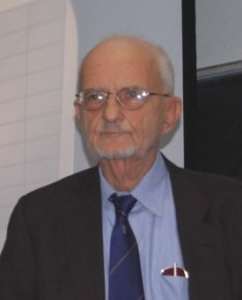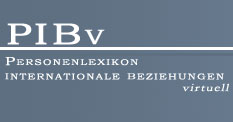Modelski, George

George (Jerzy) Modelski
*09.01.1926 in Poznan (Posen), Polen
+ 21.02.2014 in Washington D.C.
Polnisch-amerikanischer Ökonom und Politikwissenschaftler; Scientist;
IB-Theoretiker, Weltsystemtheoretiker, Hegemonietheoretiker,
Seemachttheoretiker, Kriegstheoretiker, Zyklentheoretiker,
Makrohistoriker, Evolutionstheoretiker, Globalisierungstheoretiker,
Global Cities-Theoretiker, Komparatist; Begründer der Modelski-Schule
mit William R. Thompson, Karen A. Rasler (geb. 1952) u.a.; Emeritus am
Department of Political Science, University of Washington, Seattle;
Modelski
emigrierte aus Polen und lebte in Großbritannien, Australien und den
USA. Zu seiner Biographie ist kaum etwas bekannt. Während seiner Zeit in
Canberra befaßte er sich mit den kommunistischen Ländern und dem
Ost-West-Konflikt in Südostasien, dann mit der Theorie der
Internationalen Beziehungen und kam über die Beschäftigung mit
Multinationalen Konzernen seit etwa 1973 zur quantitativen
Weltsystemtheorie und Hegemonietheorie. Einflußreich geworden ist er
durch den Ansatz, die Theorie der Langen Wellen und Leitsektoren für die
Theorie der hegemonialen Stabilität fruchtbar zu machen. Hegemonie
stützt sich auf Seemacht, die durch einen Hegemoniekoeffizienten (mehr
als 50 Prozent des weltweiten Aufkommens des jeweiligen
„Hauptkampfschiffes“) gemessen wird.

Modelski ist mit Sylvia
Modelski verheiratet, die in Port Said und Kairo aufgewachsen ist, an
der LSE in London studiert und dort wie ihr Mann den B.Sc in Economics
erworben hat
Werdegang
geboren 1926 in Poznan, Polen
Studium an der London School of Economics and Political Science (LSE)
ca. 1950 B.Sc. in Economics an der LSE
Ph.D in International Relations an der University of London
1957-1967 Mitglied des Institute of Advanced Studies, Australian National University, Canberra
1958 Feldstudie in Thailand
1959-1960 Visiting Assistant Professor, University of Chicago
1960 Gastforscher am Center for International Affairs, Woodrow Wilson School of Public and International Affairs, Princeton
1961 Feldstudie in Laos
1964 Gastforscher am Center for International Affairs, Woodrow Wilson School of Public and International Affairs, Princeton
1967-1995 Professor für Politische Wissenschaft, University of Washington, Seattle
1974 Veröffentlichung von „World Power Concentrations“
1987 Veröffentlichung von „Long Cycles and World Politics“
1987-1988
Fellow in Residence am Netherlands Institute for Advanced Studies in
the Social Sciences and Humanities (NIAS), Wassenaar
1988 Veröffentlichung von „Sea Power and Global Politics, 1494-1993“
1988 Gastforscher an der Universität Stockholm
1995 Emeritierung an der University of Washington, Seattle
1996 Veröffentlichung von „Leading Sectors and World Politics“
2006 Gastprofessor an der Scuola Superiore di Catania, Italien
derzeit wohnhaft in Washington D.C.
Preise
2012 Kondratieff Medal (in Bronze)
Mitgliedschaften
Advisory Board des Streit Council
Schriften
Bücher
Atomic Energy in the Communist Bloc. Melbourne: Melbourne University Press 1959.

The Communist International System. Princeton: Woodrow Wilson School of Public and International Affairs 1960.
The International Relations of International War. Princeton: Woodrow Wilson School of Public and International Affairs 1961.
A Theory of Foreign Policy. New York: Praeger 1962.
Indonesia and Her Neighbors: Policy Alternative to the West. Princeton: Princeton University Press 1964.
Principles of World Politics. New York: The Free Press 1972.
World Power Concentrations: Typology, Data, Explanatory Framework. Morristown, N.J.: General Learning Press 1974.
Transnational Corporations and World Order: Readings in International Political Economy. San Francisco: W.H. Freeman 1979.
Long Cycles in World Politics. Houndmills: MacMillan 1987.

Mit Wiliam R. Thompson: Seapower in Global Politics, 1494-1993. Houndmills: MacMlillan 1988.

Mit
William R. Thompson: Leading Sectors and World Politics: The
Coevolution of Global Politics and Economics. Columbia, S.C.: University
of South Carolina Press 1996.

World Cities -3000 to 2000. Washington D.C.: FAROS 2000 2003.
Herausgeber
SEATO: Six Studies. Melbourne: F.W. Cheshire 1962.
Multinational Corporations and World Order. Beverly Hills: Sage 1972.
Mit Cal Clark/Charles F. Doran: North-South Relations: Studies of Dependency Reversal. New York: Praeger 1983.
Exploring Long Cycles. Boulder, Col.: Lynne Rienner 1987.
mit Sylvia Modelski: Documenting Global Leadership. London: MacMillan 1988.
Mit
Robert A. Denemark/Jonathan Friedman/Barry K. Gills, World System
History: The Social Science of Long-term Change. London: Routledge 2000.
Mit
Tesselano Devezza/William R. Thompson: Globalization as Evolutionary
Process: Modeling Global Change. London: Routledge 2008.
Aufsätze (Auswahl)
International Relations and Area Studies: The Case of South-East Asia. In: International Relations 2.1961,3. S. 143-155.
The Asian State´s Participation in SEATO. Ii: Modelski 1962. S. 85-163.
SEATO: Its Function and Organization. In: Modelski 1962. S. 1-45.
Comparative International Systems. In: World Politics 14.1962,4. S. 662-674.
Die internationalen Beziehungen des inneren Krieges. In: Uwe Nerlich (Hrsg.): Krieg und Frieden in der modernen Staatenwelt. Beuträge der Sozialwissenschaften II. Gütersloh: Bertelsmann 1966. S. 124-146.
Engl.: The International Relations of Internal War. Princeton: Princeton University, Center for International Studies = Policy Memorandum Nr. 11.
Communism and the Globalization of Politics. In: International Studies Quarterly 12.1968, 4. S. 380 - 393 (deutsch: Der Kommunismus und die Globalisierung der Politik. In: Ekkehart Krippendorff (Hrsg.), Internationale Beziehungen. Köln: Kiepenheuer & Witsch 1973 S. 270-282).
The Long Cycle of Global Politics and the Nation State. In: Comparative Studies in Society and History 20.1978,2. S. 214-235.
Long
Cycles, Kondratieffs, and Alternating Innovations: Implications for
U.S. Foreign Policy. In: Charles W. Kegley/Patrick J. McGowan (Hrsg.):
The Political Economy of Foreign Policy Behavior. Beverly Hills, Cal.:
Sage 1981. S. 63-83.
Long Cycles and the Strategy of U.S.
International Economic Policy. In: William P. Avery/David P. Rapkin
(Hrsg.): America in a Changing World Political Economy. New York:
Longman 1982. S. 97-116.
Long Cycles of World Leadership. In:
William R. Thompson (Hrsg.): Contending Approaches to World System
Analysis. Beverly Hills, Cal.: Sage 1983. S. 115-139.
Long Cycles of World Leadership: An Annotated Bibliography. In: International Studies Notes 10.1983,3. S. 1-5.
mit Patrick M. Morgan: Understanding Global War. In: Journal of Conflict Resolution 29.1985,3. S. 391-417.
Long Cycles and Global War. In: Manus I. Midlarsky (Hrsg.): Handbook of War Studies. Winchester: Unwin Hyman 1989. S. 23-54.
Global
Leadership: End Game Scenarios. In: David P. Rapkin (Hrsg.): World
Leadership and Hegemony. Boulder, Col.: Lynne Rienner 1990. S. 241-256.
Is World Politics Evolutionary Learning? In: International Organization 44.1990,1. S. 1-24.
From
Leadership to Organization: The Evolution of Global Politics. In:
Journal of World Systems Research 1.1995,7. Unter:
gopher://csf.colorado.edu/wsystems/journals
World Systems Evolution. In: Denemark u.a. 2000.
Mit
Perry Gardner: Democratization in Long Perspective Revisited. In:
Technological Forecasting and Social Change Nr. 69, 2002. S. 359-367.
Long Term Trends in World Politics. In: Journal of World-systems Research 9.2005,2. S. 195-206.
Problems of Democratization. In: Freedom & Union 2.2007,1. S. 4-6.
Autobiographie
Steps toward Understanding Long Cycles: Some Recollections. In: Krunzel, Joseph/Rosenau, James N.:
Journeys through World Politics. Autobiographical Reflections of
Thirty-four Academic Travelers. Lexington: Lexington Books
1989. S. 179.
Sekundärliteratur
Rosecrance, Richard: Long Cycle Theory and International Relations. In: International Organization 41.1987,2. S. 283-301.
Skinner, H.B.W.: Nuclear Science under Communism. In: The New Scientist, 29.10.1959. S. 28. (Besprechung von Modelski 1959)
Debatten
Cai
Jian-Shu: Cyclical Logic in the Transition of Hegmony: Modelski´s Long
Cycle Theory in International Relations and Its Weakness. In: Journal of
World Economics and Politics Nr. 12, 2007. S. 24-32.
George
Modelski: Responding to Cui Jian-shu´s “Cyclical Logic in the Transition
of Hegemony”. Unter:
http://faculty.washington.edu/modelski/Response.htm
zum Weiterlesen
Menzel,
Ulrich: Lange Wellen und Hegemonie. Ein Literaturbericht. Bremen:
Universität Bremen 1995. 2. Aufl. Braunschweig: TU Braunschweig 1995. =
Forschungsberichte aus dem Institut für Sozialwissenschaften Nr. 13.
Midlarski, Manus I. (Hrsg.): Handbook of War Studies. Winchester: Unwin Hyman 1989.
Rasler,
Karen A./Thompson, William R.: The Great Powers and Global Struggle
1490-1990. Lexington: The University Press of Kentucky 1994.
Sonstiges
Sylvia Modelski: Port Said Revisited. Washington D.C.: FAROS 2000 2000.

Links
The Evolutionary World Politics Homepage, operated by George Modelski unter: http://faculty.washington.edu/modelski/index.html
Artikel
im Slate Magazin: The Committee: Francis Fukuyama, Neil Howe, Geroge
Modelski, Arthur Schlesinger Jr. , William Strauss. Moderated by Herbert
Stein. Unter: http://www.slate.com/?id=2356
George Modelski, World System Evolution. Unter: http://abuss.narod.ru/Biblio/WS/ws-history1_2.htm
Nachruf auf Modelski. Unter: http://www.polisci.washington.edu/Modelski.html
UM



